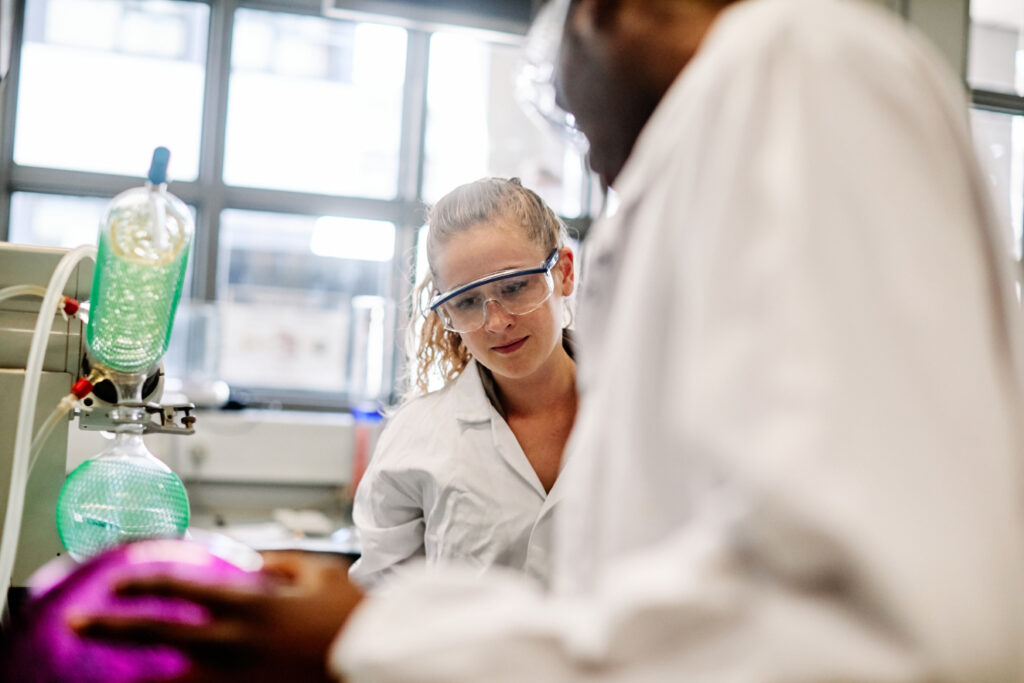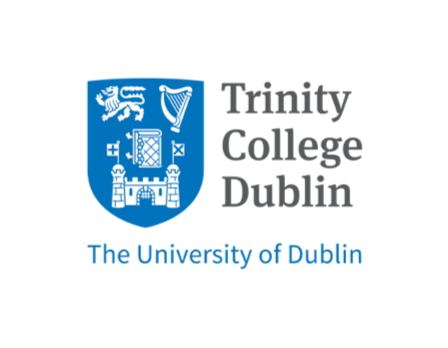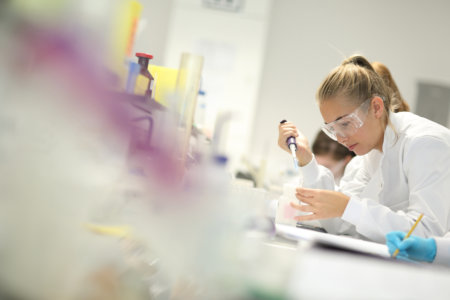Studying chemistry at university is all about discovering a world of molecules, reactions, and elements, their interactions with each other, and how we can use this knowledge to make a difference. This creative and central science connects other fields like biology, physics, and environmental science and impacts every aspect of our lives, from the medicines we take to the materials that power our technology.
It’s a fascinating field of study that can lead to diverse career options — more so if your degree is from Ireland’s #1 School of Chemistry. Trinity College Dublin’s School of Chemistry offers an Honours degree in Chemical Sciences that blends core modules with specialised tracks to match your interests and ambitions. By the time you graduate, you’ll have the high-level subject knowledge and transferable skills today’s employers are looking for.
For Manting Mu, the degree was a stepping stone to a career in research. At first, she wasn’t sure where her degree would lead her. “My interest solidified when I learned how to synthesise ibuprofen in the lab, realising that we were actually creating medicines — though I’d hesitate to trust my own batch just yet!” she says.

Trinity College Dublin has over 400 years of experience in evolving students into career-ready graduates. Source: Trinity College Dublin
Manting credits her Trinity lecturers for nurturing her interest and providing support. One particular encounter stands out in her memory — she questioned a discrepancy in lecture slides, only to discover that the textbook itself was incorrect. “The accessibility and enthusiasm from the lecturers are what I truly cherish here,” she says.
Upon completing her undergraduate degree, Manting was thrilled to receive a scholarship from the Irish Research Council, enabling her to stay on at Trinity as a PhD candidate. Having grown to love the university and the city of Dublin, she was quick to seize the opportunity to join a unique pathway for undergraduate students to transition directly to a four-year PhD programme without completing a master’s degree. “Here, curiosity meets opportunity, and I couldn’t imagine a better setting to explore the wonders of chemistry.”
A degree structured for success
Trinity Chemical Sciences students get a solid grounding in biology, chemistry, mathematics and physics, whilst cultivating many skills that’ll set them up for success in research, industry, education, healthcare, finance, consultancy, and beyond. In their third and fourth years, they can specialise in one of five moderatorships: Chemistry, Chemistry with Biosciences, Chemistry with Molecular Modelling, Medicinal Chemistry and Nanoscience.
“I chose to study Chemistry with Molecular Modelling as it provides information on reaction mechanisms, kinetics and thermodynamics without conducting experiments to scientists,” shares student Mert Can Özarpaci. “Studying this course allows one to decipher how reactions occur at the molecular level, and I find this aspect of the course fascinating.”

Trinity ranks 91st in the world for Graduate Employability. Source: Trinity College Dublin
Each moderatorship is a chance to refine and align your knowledge to your career goals. For example, in Chemistry with Molecular Modelling, students complete modules like Solid State Materials and Modelling. Medicinal Chemistry students explore Drug Design and Development. Nanoscience enthusiasts explore modules like Chemistry of Polymers and Macromolecules. Meanwhile, students in Chemistry with Biosciences dig deeper into Genomes, Disease and Diversity, Nucleic Acids, as well as modules like Introduction to Immunology and Immunometabolism.
Whichever route you take, all students complete a capstone project in their final year. You’ll conduct substantial independent research to demonstrate the skills and knowledge you’ve gained in the past four years, drawing upon insights gleaned from various subject areas. The project can be completed in Trinity, another university’s research laboratory, an external institute, or alongside one of Trinity’s many industry partners.
This is a great opportunity to work with some of the best minds in the field. With expertise spanning material science, medical devices, and beyond, Trinity researchers often collaborate with industry leaders to drive innovation and tackle real-world challenges head-on. Many lead national and international funded projects, such as those being carried out within the SFI Centre for Advanced Materials and BioEngineering Research and Trinity Biomedical Sciences Institute.
What they discover in their laboratories directly informs what you learn. “Staff at the School of Chemistry stand out in their eagerness to teach chemistry,” says student David Emanuel Elcock. “Tutorials, for example, are held in person by the lecturer in a forum-like style, which substantially improves the learning experience. Lecturers also go out of their way to reply to questions by email or in person, providing detailed and coherent answers.”
With their guidance, you’re set to stand out not just in your technical proficiency but also in your ability to problem-solve, innovate, and communicate effectively. Trinity’s chemistry graduates can be found thriving in multinationals like Amgen, Abbott, Eli Lily, Henkel, Pfizer, GlaxoSmithKline, Johnson & Johnson, Bristol-Myers Squibb, Dell, Intel, IBM and Hewlett packard — to join their ranks, apply to Trinity College Dublin’s School of Chemistry today.
Follow Trinity College Dublin on Facebook, Instagram, X, YouTube, and LinkedIn













